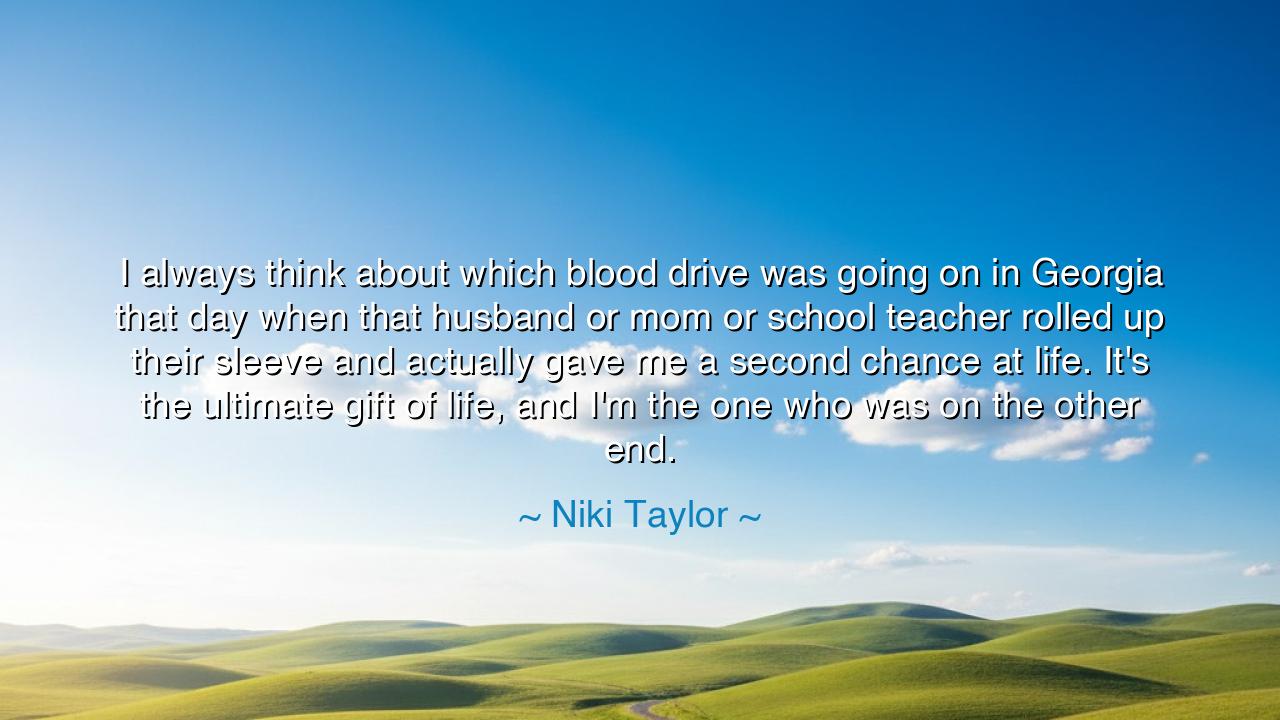
I always think about which blood drive was going on in Georgia
I always think about which blood drive was going on in Georgia that day when that husband or mom or school teacher rolled up their sleeve and actually gave me a second chance at life. It's the ultimate gift of life, and I'm the one who was on the other end.






The words of Niki Taylor strike with the force of gratitude and reverence: “I always think about which blood drive was going on in Georgia that day when that husband or mom or school teacher rolled up their sleeve and actually gave me a second chance at life. It's the ultimate gift of life, and I'm the one who was on the other end.” In this confession, there is more than memory; there is testimony to the hidden sacrifices of ordinary people who, in their quiet choices, wield the power to save another’s days upon the earth. Her voice is not one of pride but of humility, for she acknowledges that her survival was not secured by her own hand, but by the unseen mercy of strangers.
The origin of this quote lies in the model’s near-fatal car accident, when she lost massive amounts of blood and stood on the edge of death. In that hour of darkness, the blood of others became her salvation. She did not know their names, nor would she ever meet most of them, but their generosity was inscribed into her very veins. What she recalls is not just the act of giving but the mystery that somewhere, in some small town or city, an unknown soul chose to give without knowing who would receive. Thus her story reminds us that our choices ripple beyond sight, sometimes reaching those whose lives we save without ever knowing it.
The ancients, too, knew the power of sacrifice. Recall the story of Damon and Pythias, friends of Syracuse, when one offered his own life as surety for the other. Their tale has lived for centuries because it reveals the nobility of giving one’s self so another may live. And though the donors in Taylor’s story did not know her, their act was no less noble. For when one offers their blood, they give not wealth nor possessions, but part of their very being. It is a gift that cannot be measured in coin, for it is the essence of life itself.
Taylor calls this gift the ultimate gift of life. Indeed, what gift surpasses it? Food sustains for a day, wealth may ease hardship for a season, but blood—the living river within us—restores the very possibility of existence. To give it is to say, “I will weaken myself so that another may be strengthened; I will diminish that another may rise.” In her reflection, she stands as witness to the truth that the greatest acts of heroism are often clothed in ordinary garments: the husband, the mother, the schoolteacher. Heroes not of battlefields, but of clinics and donation halls.
There is also in her words a call to humility. For she confesses, “I’m the one who was on the other end.” She acknowledges that life is fragile, and that none of us stand self-sufficient. However powerful, famous, or strong we appear, there may come a day when our lives depend not on our own will but on the mercy of others. To accept this truth is to learn reverence—for life, for others, and for the unseen networks of care that uphold society.
What then shall we learn? That to give, even when the act seems small, is to participate in the preservation of life itself. A single choice, a single donation, may one day mean the difference between death and hope for another. Taylor’s gratitude teaches us that every act of compassion matters, even when unseen, and that those who give become silent guardians of strangers’ futures. In this way, life is a web: each thread holds another, and if one loosens, many fall.
Therefore, O listener, let us take practical steps: give when you can. Donate blood if your body allows. Volunteer for causes that preserve life. Support hospitals, caregivers, and those who labor unseen. And above all, live with gratitude, remembering that even your breath may one day be the fruit of another’s kindness. In every act of giving, we draw nearer to the eternal truth—that the measure of a person is not what they keep, but what they bestow.
So let Niki Taylor’s words echo across generations: life is sustained not only by our own strength, but by the courage and sacrifice of others. To give of oneself, even in drops of blood, is to join the great lineage of those who choose love over selfishness, hope over despair, and life over death. And to receive such a gift is to be reminded always: we live because others gave.






AAdministratorAdministrator
Welcome, honored guests. Please leave a comment, we will respond soon